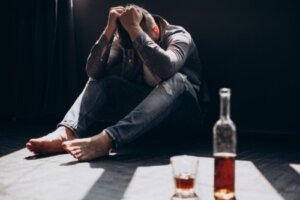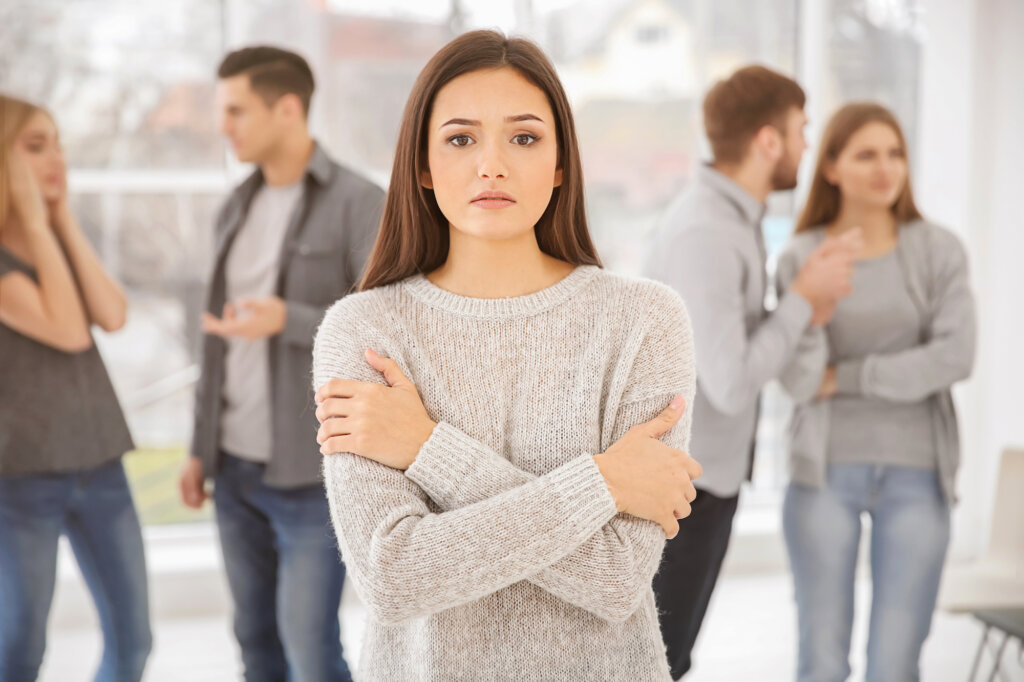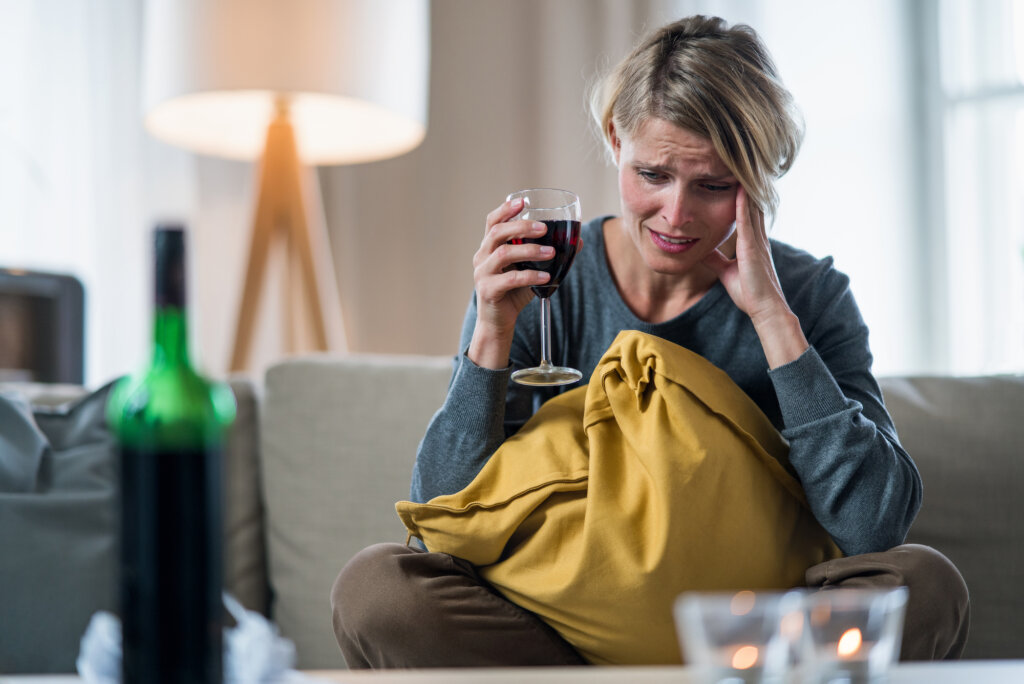Social Anxiety and Alcohol: An All Too Frequent Partnership


Reviewed and approved by the psychologist Sergio De Dios González
Social anxiety is a disorder characterized by an excessive fear of interacting with other people. For this reason, sufferers tend to isolate themselves. In fact, it could be said that, in its most extreme form, social anxiety is pathological shyness. In this case, not only is the inhibition present, but it reaches an unusual intensity.
Unfortunately, many people who suffer from social anxiety resort to inappropriate means to overcome the disorder. One of them is alcohol. This substance has the effect of disinhibition. Therefore it constitutes a fast track for reducing the symptoms of social anxiety.
For this reason, it’s not uncommon that social anxiety is often a gateway to alcoholism. This is extremely serious since it adds another issue to the existing problem. Moreover, it’s one that’s difficult to treat and eradicate. The individual experiences severe difficulties in socializing, so they self-medicate with alcohol to prevent its consequences from worsening.
“Alcohol reduces shyness, and helps control, if not prevent, the desire to avoid anxiety-provoking situations.”
-Alfredo Cía-
Social anxiety
Social anxiety is also known by other names such as social phobia or pathological shyness. As we mentioned earlier, it’s a disorder and its main manifestation is the avoidance of contact with other people. The sufferer experiences extreme fear, above all, of the negative judgment of others. This fear takes the form of feelings of shame or inhibition.
A publication from the National Institute of Mental Health claims that a sufferer of this disorder presents extremely obvious symptoms when they’re surrounded by others or have to act in front of someone. Among other manifestations of fear, they may experience the following:
- Vertigo.
- Dizziness.
- Blushing.
- Tremors.
- Sweating.
- Stuttering
- A blank mind.
- Stomach ache.
- Stiff body posture.
- Difficulty making eye contact.
The above symptoms do nothing but intensify the problem since one of the fears of sufferers is that others will notice their fear. For example, they feel really bad when they blush or stutter since these are reactions that are impossible to hide.
We should also evaluate the dysfunctional consequences of the strategies implemented to mask these symptoms. For example, sweating leads the sufferer to cover themselves up more. But this means they sweat even more. Together, these events often lead to isolation. It’s not that sufferers don’t want to interact, but they feel unable to.

Social anxiety and alcohol
Several studies have been conducted on the link between social anxiety and alcohol. In fact, research suggests that the two problems are frequently linked. This is confirmed by a study by psychiatrists, Enzo Cascardo and Pablo Resnik, from the Anxiety Medical Research Center in Argentina.
These experts conducted a study with 384 patients diagnosed with social phobia. They found that in 81 percent of the cases, there was comorbidity or coexistence between two or more problems. They also found that the majority of associations were between alcoholism or depression with social anxiety. This led the researchers to conclude that social anxiety is a disorder that almost always appears alongside others.
In their research, Cascardo and Resnik reported that 39.6 percent of people with social phobia abuse certain substances. 10.9 percent of sufferers of pathological shyness demonstrated alcohol intake without dependence. While 23.9 percent of them exhibited dependence or addiction. Therefore, it’s clear that there’s an important link between the two conditions.
The same specialists, in their book, Ansiedad, Estrés, Panico y Fobias 100 Preguntas 101 Repuestas (Stress, Panic and Phobias. 100 Questions, 101 Answers) that, during adolescence, there’s a considerable relationship between social anxiety and alcohol consumption. This is due to the fact that some young people repeatedly appeal to the effect of alcohol to face the challenges of the disorder, thus increasing their risk of dependency.

The wrong path
Some people who are victims of social phobia decide to isolate themselves and have only minimal interaction with others. Others look for strategies so that their pathological shyness doesn’t lead them to loneliness. Unfortunately, they see alcohol as a quick and apparently effective option to overcome the problem, with immediate effect.
One of the most worrying aspects of this situation is that many sufferers of social anxiety and alcohol use don’t realize it. They think it’s perfectly normal to have a couple of drinks before going to a family gathering. Or, they’re convinced that there’s nothing wrong with having to drink alcohol to give them the confidence to talk to someone they want to date or even just dance with.
Alcohol blocks self-criticism, causes an anxiolytic effect, and loosens the tongue. Many see this as a way out of their feelings of intense fear. In practice, it constitutes effective self-medication. This is why experts consider that a sufferer of pathological shyness is more likely to develop alcoholism.
Sadly, it’s often a path of no return. Others have to make enormous efforts to rid themselves of it. Consequently, experts suggest that we must understand that social anxiety and extreme shyness aren’t character traits, but they constitute a disorder. Therefore making a timely consultation with a specialist is the most reasonable course of action.
All cited sources were thoroughly reviewed by our team to ensure their quality, reliability, currency, and validity. The bibliography of this article was considered reliable and of academic or scientific accuracy.
- Cascardo, E. & Rensik, P. (2018). Ansiedad social y adolescencia: una puerta abierta al abuso de substancias. Centro IMA. Consultado el 6 de abril de 2023. https://centroima.com.ar/ansiedad-social-y-adolescencia-una-puerta-abierta-al-abuso-de-substancias/
- Instituto Nacional de Salud Mental. (2022). Trastorno de ansiedad social: Más allá de la simple timidez. Consultado el 6 de abril de 2023. https://www.nimh.nih.gov/health/publications/espanol/trastorno-de-ansiedad-social-mas-alla-de-la-simple-timidez
- Cascardo, E. & Rensik, P. (2016). Ansiedad, Estrés, Pánico y Fobias. 100 preguntas, 101 respuestas. Ediciones B. Argentina. https://www.academia.edu/41934197/ANSIEDAD_ESTR%C3%89S_P%C3%81NICO_Y_FOBIAS_100_preguntas_101_respuestas
This text is provided for informational purposes only and does not replace consultation with a professional. If in doubt, consult your specialist.








